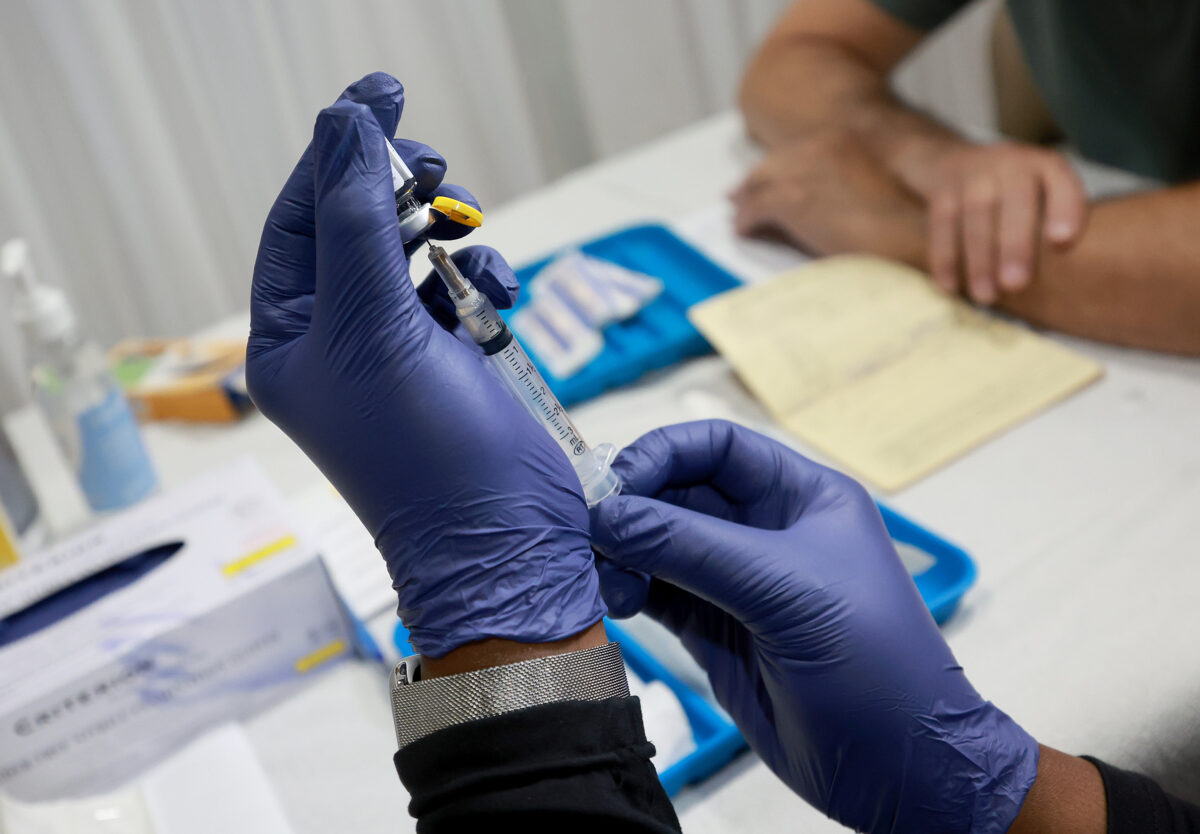PT 1: Cooking the books:
It’s our time to bat. The chance to convene a Grand Jury investigation against the CDC is finally here as Dr. Henry Ealy, and the team behind beyondthecon.com finally received a late response from the defendants on August 27.
We “now have only until September 12 to respond and urge the court, on behalf of freedom-loving Americans, to rule in our favor and get our petition before a Grand Jury to investigate our allegations against the defendants.”

So what is the CDC being accused of?
Willful misconduct and criminal data fraud.
But let’s focus on death certificates, as Dr. Henry Ealy eloquently explains the abhorrent actions taken by the CDC to inflate the COVID death count.

“We’ve all heard out there that the death certificates are wrong; people got hit by a bus and called COVID death and so forth, right? We’ve all heard that. We’ve even seen with a new filing by one of our colleagues, John Beaudoin, in Massachusetts. He got all the death certificates in Massachusetts, and he’s showing — he’s showing that people who died from the shot were counted as COVID deaths and not adverse event deaths.”
Dr. Naomi Wolf almost jumped out of her seat.

“People who died from the shot are counted as COVID deaths?!”
Ealy confirms.

“We are seeing this everywhere, Naomi. People who died from the shot are being counted as COVID deaths.”
Naomi asks, “What’s the evidence in the records that they died from the shot? Shortly after the injection or —”
Ealy: “There was one that died within five minutes of getting the injection, but they called it a COVID death.”
Naomi: “That’s the worst thing I’ve ever heard.”
Ealy: “Right? So this was a little girl. This is a little girl.”
Naomi: “Oh, my God. Oh, my God.”
Ealy: “So John [Beaudoin] got all this. Some angel behind the scenes gave him access to all of the death certificates. His team broke everything down. We’re actually going to use some of his work to corroborate what we’re saying in our response to their most recent motion to dismiss.”
“They made a little sleight of hand and said, ‘If you had pre-existing conditions and got COVID, or we think you got COVID, we’re going to ignore the pre-existing conditions — those aren’t going to be considered the cause of death — it’s always going to be COVID. And that’s the exact opposite thing that they do with every other cause of death.
And what it allowed them to do, Naomi, was to hyperinflate the death count so it looks like an emergency, when in fact, what the people really should have been listed as dying of is diabetes, or of heart failure or hypertension, or the pre-existing condition because it’s always been that your oldest known pre-existing condition is the cause of death. And infection is what is termed as an initiating factor but not a cause. And it’s a little subtle distinction, but it’s crucial when we talk about the death count for COVID.”

“So what we’re saying is that we have evidence to support a Grand Jury investigation, because what’s happened thanks to Robert Redfield did, Alex Azar did, what Xavier Becerra and Rochelle Walensky continue to do. They’ve just adopted all of those early policies, so that makes them culpable.
And what a little-known man by the name of Brian Moyer, with the head of the National Vital Statistics systems — what they all did, was they changed how death certificates were reported, violated three federal laws in the process, did not open up public comment, did not seek oversight by the Office of Management and Budget, which sits under the President’s jurisdiction, and therefore, went rogue.
And in doing that — this is where it gets crazy, Naomi. In doing that simultaneously, what they did, was the HHS erected a structure for Medicare-Medicaid insurance fraud. That led to the misappropriation of $3.5 TRILLION of U.S. taxpayer money throughout this supposed ‘crisis,’ all based upon the sleight of hand of a death certificate.”
If you’re as mad as I am and want to see these criminals behind bars, please sign this petition at beyondthecon.com. DEMAND a Grand jury investigation and share this website with all receptive family and friends. The goal is 1 million signatures before September 12.
Part 2: Ivermectin vindicated – 2 years too late

“Horse Paste” Has Been Listed as an Antiviral COVID Treatment on the NIH’s Website
The suppression of this drug “is one of the greatest stories of our lifetime, and we’re not going to let it go.”
Believe it or not, after two years of censorship, suppression, threatening of doctors’ licenses, and relentless smear campaigns as being a “horse dewormer,” the HUMAN drug of ivermectin has risen from the ashes and quietly made its way to the antiviral COVID therapy list on the NIH’s website.
Now, the description has still not changed, but it wasn’t even included in the same list as these pictured drugs before per OAN. So, baby steps. But progress.

Not too long ago, it was one of NIH’s studies that piled on a “mountain of evidence showing ivermectin is not effective at treating COVID-19.”

So what changed?
Perhaps this new, peer-reviewed paper from Dr. Pierre Kory and colleagues played a role in their decision to stealthily add the Nobel Prize-winning drug to their antiviral treatment list for COVID-19.

This was done on a controlled population of 88,102 subjects, which is a gigantic sample size for a scientific study.
Here’s the quick rundown.

Among 223,128 subjects from the city of Itajaí, 159,560 were 18 years old or up and were not infected by COVID-19 until July 7, 2020, from which 45,716 (28.7%) did not use and 113,844 (71.3%) used ivermectin. Among ivermectin users, 33,971 (29.8%) used irregularly (up to 60 mg) and 8,325 (7.3%) used regularly (more than 180 mg).
So what they were looking for here was a dose-dependent enhanced effect. As the dose increases, do we see a greater and stronger effect? That is the greatest evidence that ivermectin is not an anomaly — that it actually works, and that’s exactly what they saw in this study.
And here’s the conclusion.

“Mortality rate was 92% lower in regular users than non-users…”

“Non-use of ivermectin was associated with a 12.5-fold increase in mortality rate and a seven-fold increased risk of dying from COVID-19 compared to the regular use of ivermectin. This dose-response efficacy reinforces the prophylactic effects of ivermectin against COVID-19.”
Now think about this…
Del Bigtree, asks.
“You have Francis Collins at the head of the NIH.”

“You have Tony Fauci at NIH inside of NIAID.”

“And so, these two guys have come out strongly against ivermectin; they were pushing the vaccine. And as we pointed out many times, you could not get the emergency use authorization to rush the vaccine out if there was a product that could protect you from this illness, which this [study] shows prophylactically, it completely does.
And so they needed to squash it. So now, when we look at really one of the only studies found on the planet Earth that show that ivermectin was not effective, it goes and is led by the two guys who literally could go to jail if we prove that their denial of ivermectin got a half a million people killed in the United States of America, got doctors fired for no reason, whatsoever, and then put their patients who would have been saved in peril.
Do you realize how massive this story actually is?
I’ve been thinking about this. We keep watching these headlines go by. You keep tuning into the Highwire, and we’re really getting numb to what are horrific stories, outrageous stories of government interference when it comes to living humans in the United States of America. Is it possible Tony Fauci is responsible for over a half a million deaths within two years in the United States of America? Do you realize where that will put him in human history amongst perhaps the dictators of the world?”

“And then how many people around the world followed our mandates? How many millions didn’t use ivermectin because of this study done at the NIH? Now, I’m not saying the study is fraudulent. But what I am saying is there’s no way that we can use that as the only study, especially given the fact that we recognize the sheer bias that has to be taking place at NIH to protect their own butts.
So that against the mountain of evidence that has come up against ivermectin. This is one of the greatest stories of our lifetime, and we’re not going to let it go.”
Exactly, Del. We CAN’T let it go. Because if their actions — their negligence (at best) or deliberate suppression of ivermectin to push a vaccine agenda (at worst) gets brushed to the side and called a “whoopsie,” what precedent is that going to set?
That you can get away with deliberately squashing life-saving medications in order to serve the interests of the pharmaceutical industry? That is no world that I want anyone to live in, but sadly, that is the world we seem to be in, and it has to change.
If you want justice — if you want accountability for these criminals, please sign the petition below. Dr. Henry Ealy and his team are hoping to raise 1 million signatures to bring forth to a judge to demand a Grand Jury investigation against the CDC.
And if that goes through, it opens the door for Fauci & Friends. Please sign the petition below and share it with all receptive family and friends.

http://https//beyondthecon.com




































